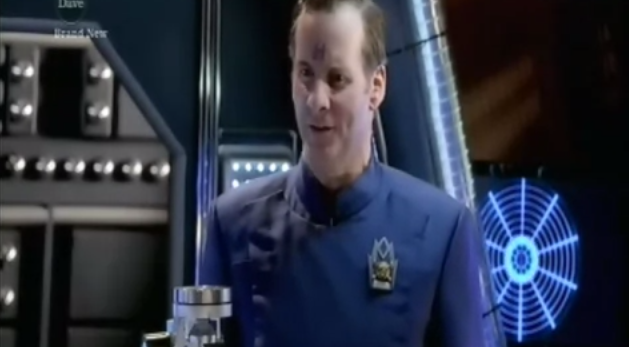
Hello and welcome to a brand new series that I thought of just now, while writing this sentence, which is good, because if I hadn’t thought of one I’m not sure where I’d go with this.
This is $1 Adventures, wherein I spend one dollar on Steam, hoping to end up having an experience that’s worth far more than that. Say, $1.01. Steam is a digital distribution service that’s home to many great games, and sales are regular and plentiful. In fact, sales are so frequent that I end up downloading tons of games that I never even find time to play. Obviously, then, the best thing for me to do is start a series in which I download even more, focusing on games that are likely shit.
As far as rules go, that’s the only one: spend no more than a dollar. That may be the game’s normal price, that may be its sale price…it doesn’t matter. I’ll then play through the game and assess its actual worth, which is legally binding I think.
And where better to start than Las Vegas, where you can take such a small amount of money and turn it into something larger, and then even larger, and then a little smaller, and then you lose your house?
So let’s move forward and invest $1 in Vegas: Make It Big, a title which lends itself to hooker jokes so cheap even I wouldn’t make them.

The first thing we see when booting it up is that the game runs automatically in Windows 95. Maybe 98. Honestly, it’s been so long since I’ve seen a launch window like this that I’m already assuming it’s a Minesweeper clone. It’s the sort of thing you’d find on those 50,000 Most Wonderful Games Ever compilation CDs, where 25,000 of the games didn’t work, 24,999 didn’t tell you how to play them, and the last was some bootleg Tetris thing that totally wasn’t a ripoff because it used bugs instead of blocks or something, and which you’d play on Saturday night well into the next morning, eating Spaghetti-Os out of a can and crying.
Those were the days.
I click “configure” to see if I can run the game in a window and I can’t, which means taking screen shots will be that much harder. Not off to a good start, Las Vegas: Make It Hard. I also check the “ReadMe” file, which is indeed in txt format, just to remind me of how not-far I’ve come since middle school. Instead of teaching me how to play the game it warns me about “performance issues.” This should be great.

Ah, so it’s Windows 98 after all.
We get some title cards and then we’re dumped at an options screen that welcomes us to The Strip and invites us to watch an episode of King of the Hill.
Actually these are two different scenarios to choose from. In the first, you build a gambling empire in the heart of Las Vegas. In the second you drink too much and verbally abuse your fat son Bobby. I go with the first.

It’s Sim City, if Sim City sucked. For starters, we’re stuck in a mandatory tutorial. The game squawks and screams at me every time I click something, because I’m not clicking the one thing it’s squawking and screaming at me to click. Unlike Sim City I don’t get to build roads leading into the sea or chemical refineries next to elementary schools for the fun of it. No, instead I need to follow instructions so precise that I honestly don’t know why Vegas: Make it Salty doesn’t just build it for me and wake me up when it’s done.
There are a wealth of options and menus and suboptions and submenus and menuoptions and optionmenus, each with its own mess of unidentifiable commands embedded within, but I’m not allowed to play with them I guess. I just need to do what the game tells me to do. It’s like going to the actual Las Vegas, but you’re with your overbearing father who won’t even let you roll down the windows because it’s too loud out there.
Las Vegas is supposed to be a world of magic, of enchantment, of gaudy approximations of enchantment and magic. It’s a place where dreams come true, and dreams are crushed. (Both, if your dream is to have your dream crushed.) But playing Vegas: Make ‘Em Laugh is like being bossed around by a crabby supervisor who keeps telling you exactly how you’re making the coffee wrong, but would rather stand in the corner with his arms crossed than help.

I eventually succeed in building my first hotel, which upsets my supervisor even more because I built it too far away from the sidewalk. Well forgive me for wanting to give my guests some exercise! There’s nothing I hate more than fat people clogging up my elevators, and that’s saying something because I hate an awful lot of everything. I figured I could discourage them from staying here by stranding my hotel in the middle of some scooter-unfriendly desert sand, but I guess not.
As penance I am forced to lay some pavement for the residents, so that they can get from the street to my hotel while bitching all the while that this walk is so long my god. It costs me another few hundred dollars to do that, and not one little pixel man thanks me for it.
Actually I just expected that the hotel would be larger. You know. Since it’s in the middle of fucking Las Vegas. Instead it’s barely the size of a small Arby’s and I had no idea how much space was going to be wasted. Oh well. At least I’ll definitely get all that lucrative wanted-to-stay-in-a-huge-city-but-couldn’t-stand-the-idea-of-an-appropriately-sized-hotel business. Ca-ching!
I’m asked to choose a theme for my hotel. I choose House of Zeus. My only other option was a gambling theme, which, let’s face it, is a cornered market. At least with House of Zeus I might be able to reel in some confused history teachers.

I don’t know what’s going on. I think the game is trying to scare me off by throwing irrelevant options and windows at me. The joke’s on it, though…I was scared off before I even booted it up.
It looks like it’s trying to both tell me how shitty a business man I am and sell me things like family portraits, sunglasses and a yacht. That’s not how salesmanship works, Vegas: Make It Soggy. You’re supposed to flatter me. Make me feel good about myself. Get me on your side and then move on to the okay okay I really want that yacht please please please let me give you all my money for a yacht.
But alas, the game won’t let me click anything. It’s as though Jesus has led me into the desert to offer me all this great stuff as a test, and I keep failing because I just nod and say “Yes please, that sounds wonderful.”

I’m told — in a way that doesn’t so much edify me as it does remind me that I sure was stupid not to know this in the first place — that I need to build a management office. I also learn how to zoom in so that I can take better screen shots, just as I’m losing interest in taking them.
The management office has some naked Greek people writhing all over each other as a motif, which I think does a great job of conveying my “no shit from anybody” management style. The default green and white checkerboard foundation also does a great job of conveying my “embarrassingly unprepared for this” entrepreneurial style.
I also tinted my upper windows, apparently, so you guys will just have to imagine for yourselves what kind of wild shenanigans I’m getting up to in my over-office penthouse on a vacant lot. (Tetris. Spaghetti-Os. Crying.)
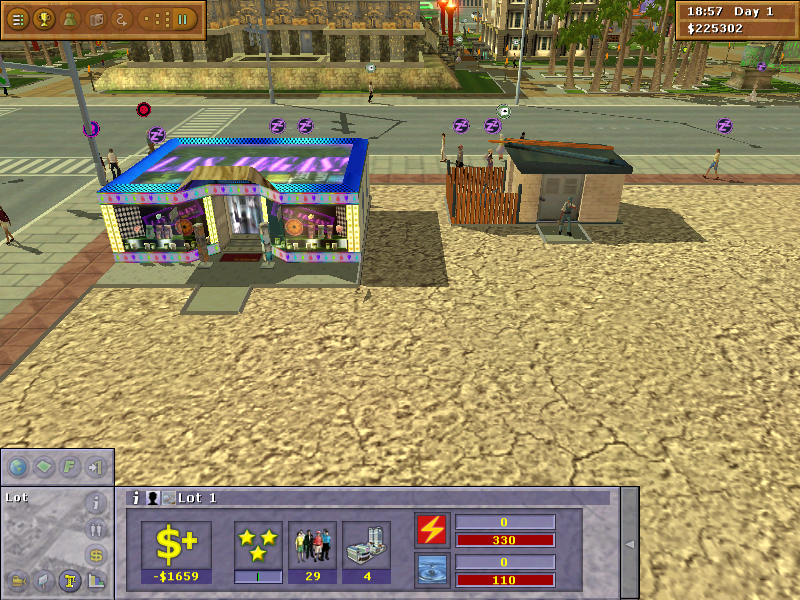
I now have to build both a souvenir shop (because who would want to forget their visit to the world famous Hotel Inaccessibility?) and a maintenance shed. I learned my lesson from the hotel, so I’m saving on paving stones by building the souvenir shop right next to the street. That’ll make it easier for both customers and robbers, which proves that I don’t play favorites.
The maintenance shed goes right next to it, because that’s faster than scrolling, and look! It even comes with a little maintenance guy to stand out front and make the shoppers feel uncomfortable!
This is Brad. Or that’s what I’m calling him anyway, because I see a man drunk before 7 o’clock at night, wiping his nose on his sleeve and standing outside waiting for a stranger to talk to him, and I think “Brad.”
Brad serves a dual purpose, I’ll say. Since he’s so close to the souvenir shop, he can help with restocking duties and unclogging toilets. He’s not particularly strong so I can’t rely on him for security, but he’d probably stop more rapes than he’d cause so overall that keeps us on the positive side of the ledger.
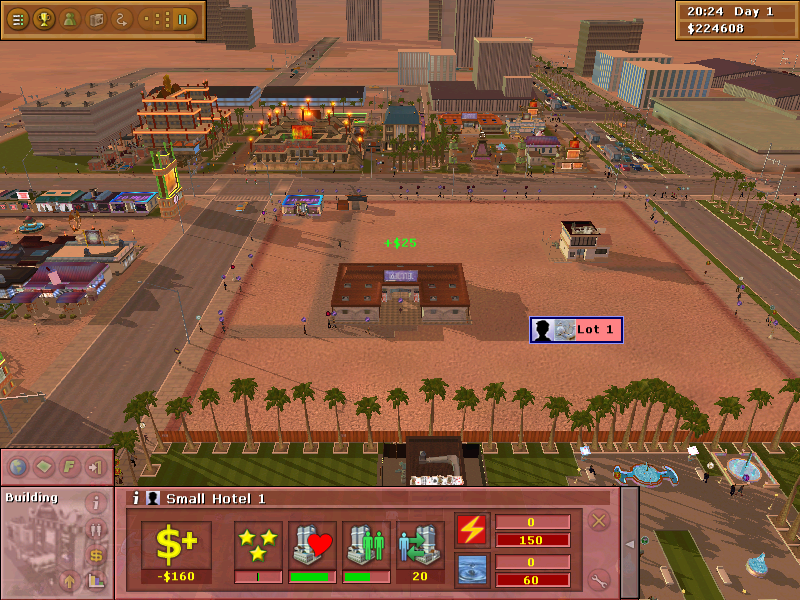
I zoom out to get a better look at my misfit empire and…and…what’s this? Somebody checked into my hotel! That’s another $25 in my pocket like that!
Wait a minute…$25? Why the hell are my rates so low? I just spent several thousand dollars paving walkways to nowhere because you assholes are afraid of getting a little sand in your shoe and all you’re giving me for a night in my hotel is $25? That’s not even enough to feed Brad! And the labor board told me I really needed to start feeding Brad!
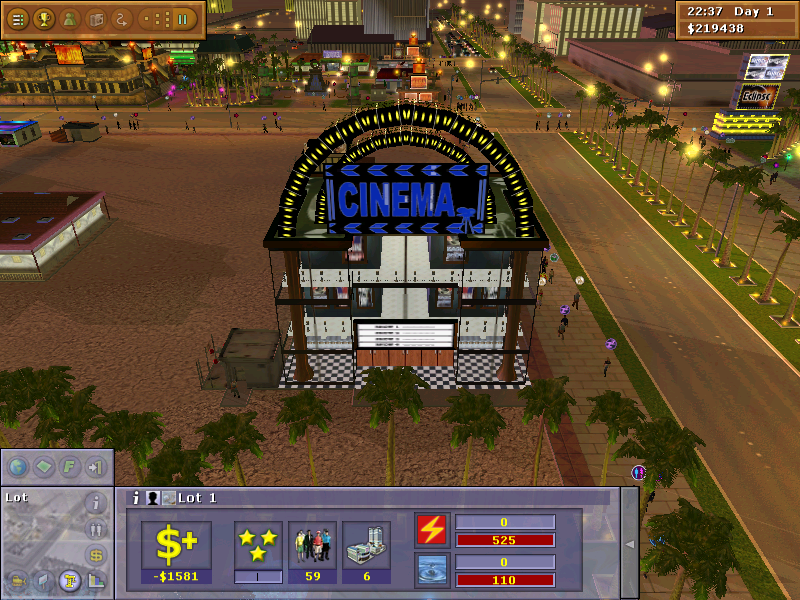
But the game doesn’t let me linger or even let me, you know, shake that fucker down for some more money which should totally be an option especially in Vegas. Instead it forces me to start placing all kinds of unnecessary crap on my property that I don’t want.
For starters, why do I have to build a movie theater? And why must that movie theater tower over the things I actually care about here, such as my hotel, and my precious sand? And how much will these movies cost anyway? Judging by the discount rates of my hotel I’d say you get to watch endless movies all night for a nickel. Maybe I’ll even shine your shoes.
Come on, Vegas: Keep It Greasy. I’m a better business man than you are…can’t we just skip this tutorial already? You’re forcing me into the role of theater mogul and I think I should have the right to put the breaks on this new career path.
I also need to build another maintenance shed, only this one is for maintaining the theater. Come on, I have Brad! This is his job! Do we really need a whole other building with a whole different name and a whole new even-shittier-looking appearance to drag down my own property values?
I put it immediately to the left of my cinema, so that I don’t have to pay for this guy to take a taxi to work or something. It even comes with a whole new creep to stand outside and accost women and children who were dumb enough to go to my theater alone.
I’m telling you right now if you’re reading this: I don’t know this man. I can’t seem to force him to leave my property. Until I can get rid of him please don’t go to my theater alone.
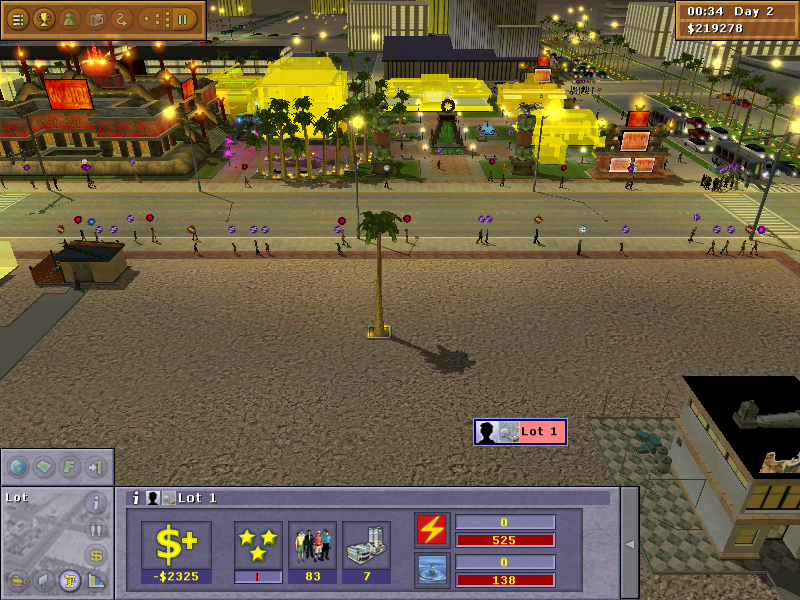
Anyway, that’s a hotel, a management office, two maintenance sheds, a souvenir shop, a movie theater, and six hundred trillion miles worth of paving stones. Not bad for a single day’s construction.
Not bad…but not enough! The game now informs me that in addition to disappointing my parents, wasting money on a worthless literature degree and regularly throwing my vote away, my near-vacant lot in the middle of the slummiest slums of Las Vegas isn’t “beautiful” enough.
The game even overlays a filter showing me, scientifically, exactly how not-beautiful my investment property really is. It’s the video game equivalent of someone not only lecturing you on how you should take better care of your money, but actually producing photocopied bank statements to definitively prove that you are incapable of taking care of yourself.
So it tells me to plant a tree. And I plant a tree.
And damned if this isn’t suddenly the most beautiful patch of desolate earth in Vegas. I even check the overlay again, and, sure enough, the tree is radiating green pixels that — as in real life — symbolize beauty.
Man this tree is just gorgeous. I even kept it away from Brad and that sex offender who lives next to the theater, because it’s a beauty that I simply couldn’t bear to see corrupted.
Also I don’t want them grabbing free coconuts or anything. Those guys are robbing me blind!
At long last, after so much waiting, nearly one full day after I came to Vegas with nothing in my pocket but hundreds of thousands of dollars and a screaming tutorial, I build a casino.
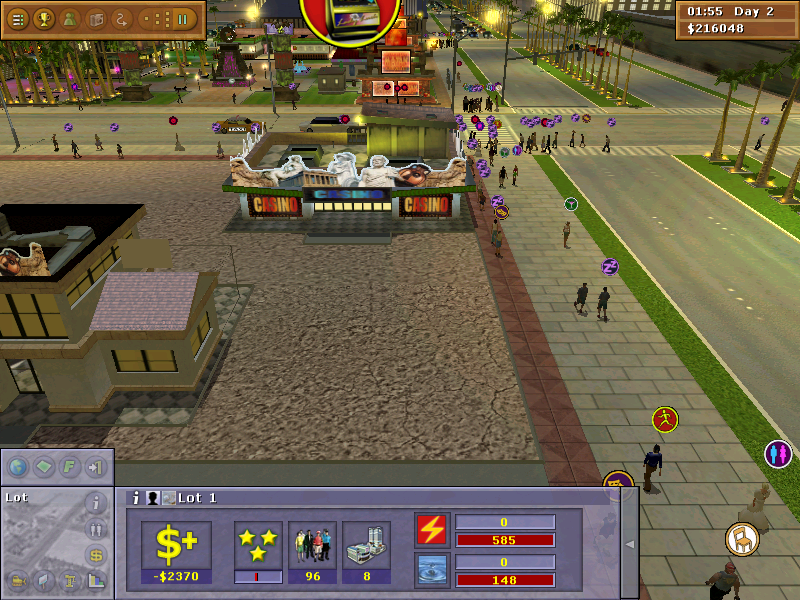
I think I’ve got the perfect name for it, too: Casino Casino Casino. It’s like Circus Circus, but with Casino instead of Circus, and three of them rather than two.
I predict big things for Casino Casino Casino. And by that I mean I predict I’ll never visit it again once I shut this game off. Good news, Casino Casino Casino…you won’t have management breathing down your neck.
I’m noticing a man in the lower right of that picture, walking along The Strip and daydreaming about wooden chairs. I wonder what kind of simulation he goes home and plays at night.
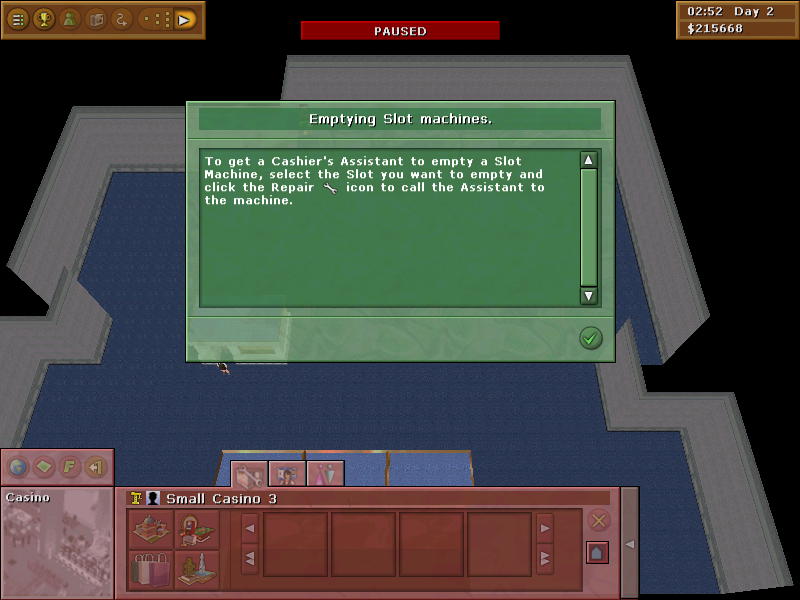
I’m invited into my own casino, which is pretty nice, considering that neither Brad nor the sex offender ever invited me inside, and the souvenir shop didn’t even let me browse my own selection of walnuts with googly eyes that say I WENT NUTS IN VEGAS.
My excitement is short-lived, however, as they just want to make me decorate the place. That might normally be fun, but then they start teaching me about how to maintain the machines and unload the money and all that crap.
Why am I doing this stuff myself? I only install one slot machine because as soon as I install it I’m assailed with windows trying to teach me about all the various things I’ll need to do in order to keep the thing operational.
Isn’t that why I have a staff? Donald Trump doesn’t have to get down on his knees and recalibrate spinwheels. He doesn’t have to vacuum the rugs and pick the green M&M’s out of Tony Orlando’s candy bowl. No, he has other people do that for him, so he can stand on top of a skyscraper shouting about Sharia law and birth certificates. That’s what I want to be doing!
Perhaps — and, really, just stay with me here — I should have hired a staff before I opened four disparate places of business. Perhaps — and, yes, I know I’m new here but I think I might have some insight — these places would run so much better if I wasn’t running them all myself, simultaneously, with no help. Perhaps — and I really do hope I’m not overstepping any boundaries here — an entire massive gambling vacation resort needs more than two maintenance guys who never leave the shed and a CEO who dutifully scrubs every toilet with his own loving touch.
Why oh why am I now in charge of emptying slot machines? Aren’t I supposed to be managing the company? Can’t somebody else sell chewing gum or do I have to man the concession desk myself, too?
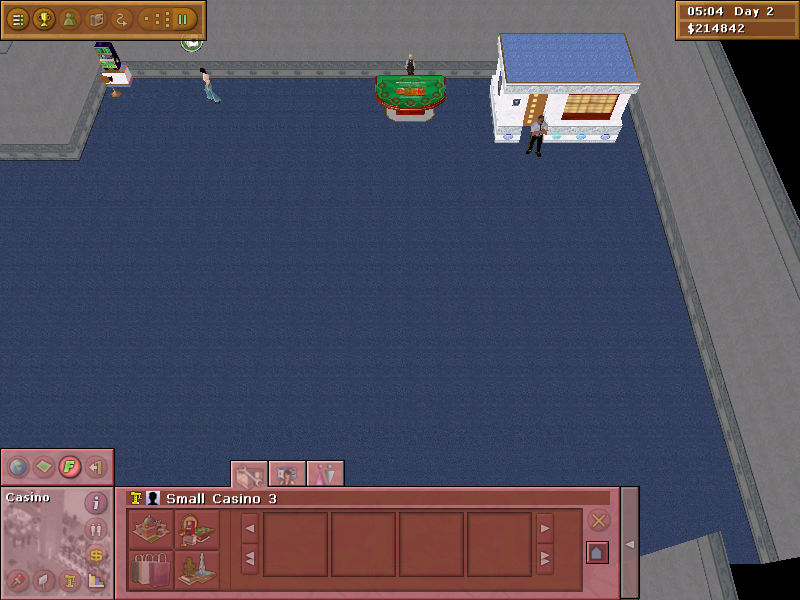
Anyway, welcome to the floor of Casino Casino Casino. I’m already overworked to Hell and back so I’ve limited myself to a slot machine, a black jack table, and a security guard.
This should work well, I think. It’s no frills, I know, but I’m not much one for frills anyway, and with the security guard I have at least one extra set of hands to help keep the place running. I know that that’s not his job, strictly speaking, but if I’m washing sheets and singing lullabies to Brad then maybe Officer Hardass here can pitch in a bit as well.
THEN AGAIN MAYBE NOT:
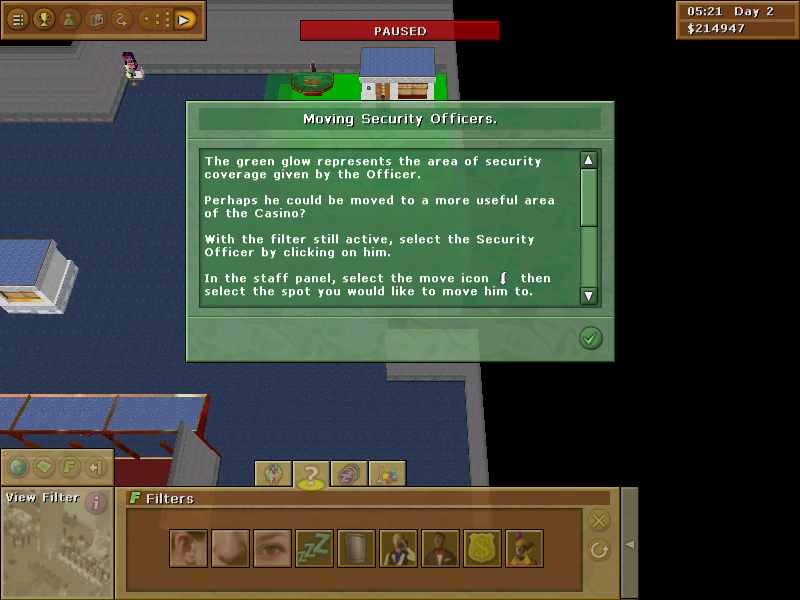
Come on now! I need to move this bastard’s legs as well? Can these people not do anything without me?
The asshole I hired sees a crime — in a casino that has a whole two gambling stations — and I need to come in and bend his knees for him so that he can go investigate?
This is getting ridiculous. Who knew the workforce in Las Vegas was this unmotivated? These are the laziest people on Earth. Do I need to keep checking on him to make sure he didn’t drink too much liquid on the job? What if he did? Would I have to walk him step by step to the bathroom, undo his belt, and squeeze him until urine comes out?
For crying out loud, man, I shouldn’t need to carry you back and forth across the casino floor. I know the economy is tough, but it’s not so tough that I need to hire invalids as my security guards and maintenance men.
I can’t spend all day babysitting him in here. I need to get back outside. Somebody might be vandalizing the tree!
I’m not doing it. If you want to move across the casino floor, you can move yourself across the casino floor.
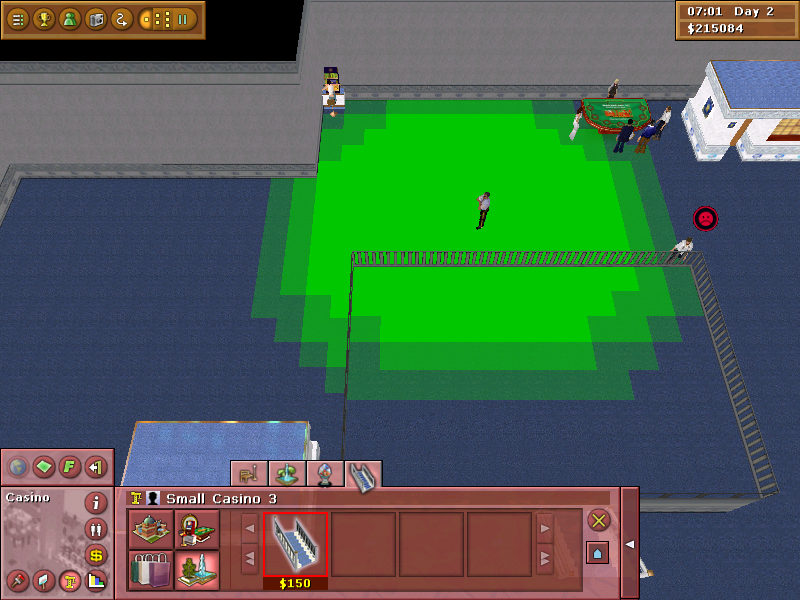
Needless to say I move Officer Useless across the casino floor. It requires me to click a series of very precise icons in such an unintuitive way that I think it would be easier to just slice his legs open and tug on the muscles myself.
He makes it halfway across the floor before giving up — which, to be fair, coincides exactly with me giving up — and stands with his arms crossed, splashing green light everywhere which now represents security. So, well done. I’ve secured this empty patch of the casino which somehow manages not to encompass either of the two areas where security might be necessary.
One of my lone, confused patrons walks over to an unused raised platform, surveys the emptiness around him and inside of himself, and frowns.
I know the feeling, sad man. I too came to Vegas seeking something larger. I too ended up in an empty casino that really shouldn’t be open to the public until it’s actually stocked and staffed. I too had a dollar in my pocket, and hoped against hope that it would lead me to something bigger.
Here you go, friend. These are the keys to Casino Casino Casino. It’s yours now. And I won’t be coming back again. I’m leaving Las Vegas. Like Nicolas Cage. But with the sense to know when to quit.
Vegas: Make It Big
Released: Dec. 21, 2006
Price on Steam: $0.99
Regular Price on Steam: $4.99
Price It Should Be on Steam: -$25, in honor of my first and only guest at the House of Zeus
 FTC Disclosure: I received a copy of this CD in exchange for review. No money changed hands and all opinions presented here are my own.
FTC Disclosure: I received a copy of this CD in exchange for review. No money changed hands and all opinions presented here are my own.

















